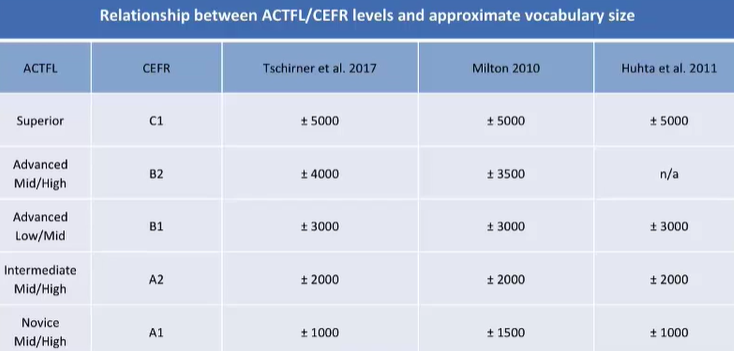Vocabulary vs. Grammar: Where to begin? Posted by Transparent Language on Apr 14, 2021 in For Educators, For Learners, Learning + Usage Tips
You have limited time to study your target language. How should you spend it?
For beginner and intermediate learners, we typically recommend focusing on vocabulary. Read on to find out why, or skip to the video at the bottom to watch a replay of our webinar explaining why vocab matters more than you think.
How is vocab related to proficiency?
We don’t underestimate the importance of grammar, but studies1,2,3 have shown that, of all the factors contributing to language proficiency, vocabulary size is by far the single most significant factor.
Data consistently show that progressively larger vocabulary sizes are associated with progressively higher proficiency levels4.

Why focus on vocabulary?
1. Vocabulary can be “chunked”.
Did you know your brain processes languages using two different memory systems? The declarative memory learns facts: words, phrases, numbers, etc. The procedural memory learns skills, such as applying a grammar rule.
Much of what was originally thought to be processed by the procedural memory is actually declarative. For example, an expression like “I do not know” was traditionally thought to be an exercise in grammar—conjugating “know”, negating with “not”, etc. But this is actually processed declaratively as a “chunk”. The more of these “chunks” you know, the less time you need to process and produce fluent speech.
Learners with large vocabularies can draw from these pre-constructed chunks, stringing them together into longer, more “native-like” sentences.
2. Vocabulary actually helps you master different grammatical functions!
When you think of grammar you probably think of things like verb conjugations. A sufficiently large and carefully curated vocabulary supports learning those kinds of grammar rules5 and becomes the foundation on which grammar rules can be applied in new and imaginative ways6.
We challenge you to come up with a sentence in the past perfect tense without using any nouns, adjectives, or objects. ?
Vocabulary as an investment in grammar goes beyond the obvious need for words to use in examples.
Consider semantics and pragmatics. These two constraints of grammar are learned through vocabulary and fully processing the meaning of words. Semantics has to do with the actual definition of a word or text. Pragmatics refers to how words are used in a practical sense, or in context.
For example, if someone said to you “could you crack the window?” semantically you know that “to crack” means to break, but pragmatically you know that they want you to open the window.
To understand the sentence, the many meanings of individual vocabulary words and idiomatic expression must be known and carefully studied.
3. Vocabulary also helps with all four skills (listening, speaking, reading, and writing).
Have you ever been listening to someone speak and got stuck on a single word, turning it over in your mind only to miss the next 30 seconds of the conversation?
Vocabulary can plug those holes, making it easier to listen, speak, read, or write in the target language.
It also frees up your brain to pick up on other aspects of the language that are important for fluency—cultural references, proper pronunciation, and application of grammar patterns (as you know now).
Where does grammar fit in?
Communicating is ultimately about sharing ideas. You don’t need to be native-like to express an idea successfully. Need medical assistance? The single word “hospital” or “doctor” will likely get you what you need.
But if your goal is to have personal or professional life in the language and to express your ideas eloquently, grammar is a must.
As you’re learning vocabulary chunks, start looking for grammar patterns! That’s actually how you learned grammar in your native language, by seeing it in context and deducing the grammar rules. Then you can apply those rules and patterns in the classroom or when communicating with your friends or colleagues. (But that is a topic for another day!)
Want to know more about a vocab-first approach to language learning? Watch a replay of our webinar on the subject!
1 Alderson, J.C. (2005). Diagnosing foreign language proficiency. London: Continuum.
2 Laufer, B. (1992). How much lexis is necessary for reading comprehension? In H. Bejoint & P. Arnaud (Eds.), Vocabulary and applied linguistics (pp. 126–132). London: Macmillan.
3 Stæhr, L. S. (2008). Vocabulary size and the skills of listening, reading and writing. Language Learning Journal, 36(2), 139-152.
4 Milton, J. (2010) Measuring the contribution of vocabulary knowledge to proficiency in the four skills.
5 Nation, I.S.P. (2001) Learning Vocabulary in Another Language, 336.
6 Lewis, M. (2002) Implementing the Lexical Approach: Putting Theory into Practice.

Build vocabulary, practice pronunciation, and more with Transparent Language Online. Available anytime, anywhere, on any device.




Comments:
Ngozi Egonu:
Thanks. Quite inspiring. Do you study Igbo language, one of the Nigerian languages in West Africa.
Thomas Kopf:
Yes, I think it’s worth focusing on vocabulary, too.
I’ve spent a lot of time on grammar, and I know quite a lot, but I can’t speak or listen because my vocabulary is poor.